|
|
|
Sort Order |
|
|
|
Items / Page
|
|
|
|
|
|
|
| Srl | Item |
| 1 |
ID:
172991
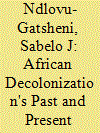

|
|
|
|
|
| Summary/Abstract |
Decolonization has reemerged as a compelling vision of a better future.
|
|
|
|
|
|
|
|
|
|
|
|
|
|
|
|
| 2 |
ID:
137722
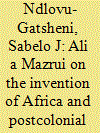

|
|
|
|
|
| Summary/Abstract |
Ali A Mazrui’s academic and intellectual fame provoked both deep admiration and severe criticism, causing his intellectual legacy to be caught up between what the South Sudanese scholar Dustan M Wai depicted as ‘Mazruiphilia’ (hagiographical celebration) and ‘Mazruiphobia’ (critical bashing). Mazrui died on 12 October 2014, leaving behind a ‘supermarket of ideas’ and a rich archive that easily immortalises him. This article aims to transcend both Mazruiphilia and Mazruiphobia through the adoption of an approach which avoids a sententious orientation while critically engaging with Mazrui’s contributions to the topical questions of the invention of Africa, Africanity and the African condition. From Mazrui’s ‘supermarket of ideas’ the article takes one of the debates in his expansive work – that of Africanity – as its departure point to engage with his contribution to African Studies and pay tribute to this African intellectual giant.
|
|
|
|
|
|
|
|
|
|
|
|
|
|
|
|
| 3 |
ID:
101589
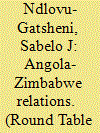

|
|
|
|
|
| Publication |
2010.
|
| Summary/Abstract |
The common approach to the study of foreign policies of Southern African Development Community (SADC) states is to locate them within the context of 'brother presidents' and 'sister liberation movements'. There is emphasis on liberation war camaraderie as a key variable. However, Angola-Zimbabwe (read as MPLA-ZANU-PF and MPLA-MDC) relations have no noticeable strong liberation war-time ties. The relations are traceable to the post-1980 period when the Zimbabwe African National Union-Patriotic Front (ZANU-PF) pursued a deliberate policy of integrating itself within the SADC region and this coincided with the Popular Movement for the Liberation of Angola's (MPLA) long-time desire to isolate its internal enemies of the National Front for the Liberation of Angola and the National Union for the Total Independence of Angola. What is also noticeable is the opacity and ambiguities in Angola-Zimbabwe relations, which have provoked growth of speculation and suspicion. The only time Angola and Zimbabwe openly collaborated was in their intervention in the Democratic Republic of Congo war in 1998 under the auspices of the SADC in general and the SADC Organ on Politics, Defence and Security in particular. However, two recent developments-the state visit to Luanda by the Prime Minister of Zimbabwe and the leader of the Movement for Democratic Change (MDC-T) Morgan Tsvangirai in October 2009, and the announcement by ZANU-PF of the China-Sonangol $8bn investment deal in November 2009-have provoked fresh interest in understanding Angola-Zimbabwe relations in the context of a regional initiative to resolve the Zimbabwe crisis. Although Angola is visible as a member of the SADC in the search for a solution to the Zimbabwe crisis, it has not openly expressed its foreign policy towards Zimbabwe. Unlike Botswana under Ian Khama and Zambia under the late Levy Mwanawasa, which openly criticised President Robert Mugabe and ZANU-PF over governance and its human rights record, Angola has remained quiet, making it hard to know its exact position vis-agrave-vis initiatives towards resolution of the Zimbabwe crisis. Interest in Angolan foreign policy is further motivated by the fact of its ascendancy as one of the regional powers; building on its rich mineral resources, it has the potential leverage to help in the resolution of the Zimbabwe crisis if it openly expressed its position. At the moment, it is not clear whether Angola has also adopted 'quiet diplomacy', just like South Africa under President Thabo Mbeki in its dealings with Zimbabwe.
|
|
|
|
|
|
|
|
|
|
|
|
|
|
|
|
| 4 |
ID:
110107
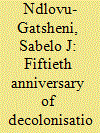

|
|
|
|
|
| Publication |
2012.
|
| Summary/Abstract |
This article deploys the concept of coloniality of power to critically reflect on the decolonisation process, using a 'colonial difference' perspective which enables a critical reflection on the limits of decolonisation from the side of the ex-colonised ordinary citizens of Africa. Three principal arguments are advanced. First, celebration of the decolonisation process as the proudest moment in African history obscures the continuing operation of the colonial matrices of power in maintaining Africa's subaltern position in global politics. Second, decolonisation resulted only in politico-juridical freedom, which is often conflated with freedom for the ordinary peoples of Africa. Third, celebrations of decolonisation are belied by the fact that ordinary African citizens engaged in new struggles for freedom soon after decolonisation aimed at liberating themselves from oppression by the inherited and imposed postcolonial African state. The article delves into the genealogical, ideological and ethical elements of decolonisation, alongside its political assumptions and implications. This facilitates the decoupling of ideas of liberation from notions of emancipation, which are often considered the same thing. It also enables critical engagement with the character of the postcolonial African state imposed on Africans without being fully reconstituted and decolonized institutionally. The article provides a fresh appreciation of ordinary citizens' ongoing struggles for liberation from the postcolonial state exemplified by the current North African popular uprisings against dictatorial regimes.
|
|
|
|
|
|
|
|
|
|
|
|
|
|
|
|
| 5 |
ID:
135036
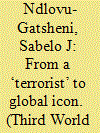

|
|
|
|
|
| Summary/Abstract |
This article examines Nelson Rolihlahla Mandela’s political life and legacy from the perspective of critical decolonial liberation ethics, which privileges a paradigm of peace, humanism and racial harmony and opposes the imperial/colonial/apartheid paradigm of war, racial hatred and separation of races. This system emerged in the 15th century and was driven by the desire to conquer, dispossess, colonise, exploit and segregate people according to race and, alongside imperatives of primitive accumulation, it informed the colonisation of South Africa and the imposition of apartheid. Mandela was a liberation fighter who provided an antidote to the colonial ideology of racial profiling and hierarchisation. What distinguished him from other freedom fighters was his commitment to the cause of human rights as early as the 1960s, long before it attained its status as a constitutive part of global normative order. When Mandela became the first black president of a democratic South Africa, his practical and symbolic overtures to whites and his reconciliatory politics aimed to call them back to a new inclusive humanity. Critical decolonial ethics logically enables a tribute to Mandela that privileges his commitment to a post-racial society and new humanism.
|
|
|
|
|
|
|
|
|
|
|
|
|
|
|
|
| 6 |
ID:
090208
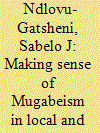

|
|
|
|
|
| Publication |
2009.
|
| Summary/Abstract |
President Robert Mugabe of Zimbabwe has emerged as one of the most controversial political figures since 2000, eliciting both admiration and condemnation. What is termed 'Mugabeism' is a summation of a constellation of political controversies, political behaviour, political ideas, utterances, rhetoric and actions that have crystallised around Mugabe's political life. It is a contested phenomenon with the nationalist aligned scholars understanding it as a pan-African redemptive ideology opposed to all forms of imperialism and colonialism and dedicated to a radical redistributive project predicated on redress of colonial injustices. A neoliberal-inspired perspective sees Mugabeism as a form of racial chauvinism and authoritarianism marked by antipathy towards norms of liberal governance and disdain for human rights and democracy. This article seeks to analyse Mugabeism as populist phenomenon propelled through articulatory practices and empty signifiers. As such it can be read at many levels: as a form of left-nationalism; as Afro-radicalism and nativism; a patriarchal neo-traditional cultural nationalism and an antithesis of democracy and human rights. All these representations make sense within the context of colonial, nationalist, postcolonial and even pre-colonial history that Mugabe has deployed to sustain and support his political views.
|
|
|
|
|
|
|
|
|
|
|
|
|
|
|
|
| 7 |
ID:
106630
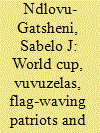

|
|
|
|
|
| Publication |
2011.
|
| Summary/Abstract |
The recent hosting of the World Cup by South Africa invoked what Michael Billig has termed 'banal nationalism', manifesting itself through blowing of 'Vuvuzelas', waving and displaying of the national flag on vehicles, as well as the wearing of sports regalia (Football Friday) by the people across racial, ethnic and class divisions. The support for the national team-'Bafana Bafana' occupied the national centre stage and became the main symbol around which national pride and unity crystallised. How long will this national unity survive the event? Is South Africa experiencing one month of fake nationhood? Is this national unity a sign of triumphalism over divisive nationalisms of the past? This article deploys a combination of Billig's concept of banal nationalism, Foucaldian discourse analysis and a historical approach to examine how South African nationalists used the World Cup to enhance the project of nation building. The article analyses the various debates about the nation provoked by the hosting of the World Cup, particularly how the mega-event spawned a strong spirit of national unity on the one hand, while simultaneously bringing into sharp focus glaring class divisions and threats of xenophobia, on the other. It brings together the views of left-leaning dissenters, Afro-pessimists and nationalist optimists on the impact and meaning of the World Cup for South Africa. Its key hypothesis is that these competing perspectives cannot be understood without acknowledging the local context of a society emerging from apartheid oppression and racism, existing within a global terrain that is provoking contradictory notions of belonging and being an aspirant nation with a weak sense of nationhood.
|
|
|
|
|
|
|
|
|
|
|
|
|
|
|
|
|
|
|
|
|